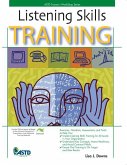- Broschiertes Buch
- Merkliste
- Auf die Merkliste
- Bewerten Bewerten
- Teilen
- Produkt teilen
- Produkterinnerung
- Produkterinnerung
This 1996 book examines the consequences, and policy implications of failure in training provision and skills acquisition in the industrial world.
Andere Kunden interessierten sich auch für
![Developing Great Managers: 20 Power-Hour Conversations That Build Skills Fast [With CDROM] Developing Great Managers: 20 Power-Hour Conversations That Build Skills Fast [With CDROM]]() Lisa HanebergDeveloping Great Managers: 20 Power-Hour Conversations That Build Skills Fast [With CDROM]38,99 €
Lisa HanebergDeveloping Great Managers: 20 Power-Hour Conversations That Build Skills Fast [With CDROM]38,99 €![Listening Skills Training Listening Skills Training]() Lisa J. DownsListening Skills Training54,99 €
Lisa J. DownsListening Skills Training54,99 €![Communication Skills Virtual Training Communication Skills Virtual Training]() Maureen OreyCommunication Skills Virtual Training81,99 €
Maureen OreyCommunication Skills Virtual Training81,99 €![Proving the Value of Soft Skills Proving the Value of Soft Skills]() Patricia Pulliam PhillipsProving the Value of Soft Skills43,99 €
Patricia Pulliam PhillipsProving the Value of Soft Skills43,99 €![Negotiating for Success: Essential Strategies and Skills Negotiating for Success: Essential Strategies and Skills]() George SiedelNegotiating for Success: Essential Strategies and Skills16,99 €
George SiedelNegotiating for Success: Essential Strategies and Skills16,99 €![The Australian Career Passport: Cross the Career Border with Your Core Skills for Work The Australian Career Passport: Cross the Career Border with Your Core Skills for Work]() Lawrence ArnoldThe Australian Career Passport: Cross the Career Border with Your Core Skills for Work29,99 €
Lawrence ArnoldThe Australian Career Passport: Cross the Career Border with Your Core Skills for Work29,99 €![Charisma: 7 Ways To Develop Genuine Charisma, Social Skills & Increase Your Confidence Charisma: 7 Ways To Develop Genuine Charisma, Social Skills & Increase Your Confidence]() Darcy CarterCharisma: 7 Ways To Develop Genuine Charisma, Social Skills & Increase Your Confidence18,99 €
Darcy CarterCharisma: 7 Ways To Develop Genuine Charisma, Social Skills & Increase Your Confidence18,99 €-
-
-
This 1996 book examines the consequences, and policy implications of failure in training provision and skills acquisition in the industrial world.
Hinweis: Dieser Artikel kann nur an eine deutsche Lieferadresse ausgeliefert werden.
Hinweis: Dieser Artikel kann nur an eine deutsche Lieferadresse ausgeliefert werden.
Produktdetails
- Produktdetails
- Verlag: Cambridge University Press
- Seitenzahl: 376
- Erscheinungstermin: 20. März 2008
- Englisch
- Abmessung: 229mm x 152mm x 22mm
- Gewicht: 609g
- ISBN-13: 9780521479578
- ISBN-10: 0521479576
- Artikelnr.: 23800227
- Herstellerkennzeichnung
- Books on Demand GmbH
- In de Tarpen 42
- 22848 Norderstedt
- info@bod.de
- 040 53433511
- Verlag: Cambridge University Press
- Seitenzahl: 376
- Erscheinungstermin: 20. März 2008
- Englisch
- Abmessung: 229mm x 152mm x 22mm
- Gewicht: 609g
- ISBN-13: 9780521479578
- ISBN-10: 0521479576
- Artikelnr.: 23800227
- Herstellerkennzeichnung
- Books on Demand GmbH
- In de Tarpen 42
- 22848 Norderstedt
- info@bod.de
- 040 53433511
List of figures; List of tables; Preface; List of contributors; 1.
Introduction: does the free market produce enough skills? Alison L. Booth
and Dennis J. Snower; Part I. Market Failures: the Causes of Skills Gaps:
2. Transferable training and poaching externalities Margaret Stevens; 3.
Credit constraints, investment externalities and growth Daron Acemoglu; 4.
Education and matching externalities Kenneth Burdett and Eric Smith; 5.
Dynamic competition for market share and the failure of the market for
skilled labour David Ulph; 6. The low-skill, bad-job trap Dennis J. Snower;
Part II. Empirical Consequences of Skills Gaps: 7. Changes in the relative
demand for skills Stephen Machin; 8. Skill shortages, productivity growth
and wage inflation Jonathan Haskel and Christopher Martin; 9. Workforce
skills, product quality and economic performance Geoff Mason, Bart Van Ark,
and Karin Wagner; 10. Workforce skills and export competitiveness Nicholas
Oulton; Part III. Government Failures and Policy Issues: 11. Market failure
and government failure in skills investment David Finegold; 12. Training
implications of regulation compliance and business cycles Alan Felstead and
Francis Green; 13. On apprenticeship qualifications and labour mobility
Alison L. Booth and Stephen Satchell; 14. Evaluating the assumptions that
underlie training policy Ewart Keep and Ken Mayhew; 15. Conclusions:
government policy to promote the acquisition of skills Dennis J. Snower and
Alison L. Booth; Index.
Introduction: does the free market produce enough skills? Alison L. Booth
and Dennis J. Snower; Part I. Market Failures: the Causes of Skills Gaps:
2. Transferable training and poaching externalities Margaret Stevens; 3.
Credit constraints, investment externalities and growth Daron Acemoglu; 4.
Education and matching externalities Kenneth Burdett and Eric Smith; 5.
Dynamic competition for market share and the failure of the market for
skilled labour David Ulph; 6. The low-skill, bad-job trap Dennis J. Snower;
Part II. Empirical Consequences of Skills Gaps: 7. Changes in the relative
demand for skills Stephen Machin; 8. Skill shortages, productivity growth
and wage inflation Jonathan Haskel and Christopher Martin; 9. Workforce
skills, product quality and economic performance Geoff Mason, Bart Van Ark,
and Karin Wagner; 10. Workforce skills and export competitiveness Nicholas
Oulton; Part III. Government Failures and Policy Issues: 11. Market failure
and government failure in skills investment David Finegold; 12. Training
implications of regulation compliance and business cycles Alan Felstead and
Francis Green; 13. On apprenticeship qualifications and labour mobility
Alison L. Booth and Stephen Satchell; 14. Evaluating the assumptions that
underlie training policy Ewart Keep and Ken Mayhew; 15. Conclusions:
government policy to promote the acquisition of skills Dennis J. Snower and
Alison L. Booth; Index.
List of figures; List of tables; Preface; List of contributors; 1.
Introduction: does the free market produce enough skills? Alison L. Booth
and Dennis J. Snower; Part I. Market Failures: the Causes of Skills Gaps:
2. Transferable training and poaching externalities Margaret Stevens; 3.
Credit constraints, investment externalities and growth Daron Acemoglu; 4.
Education and matching externalities Kenneth Burdett and Eric Smith; 5.
Dynamic competition for market share and the failure of the market for
skilled labour David Ulph; 6. The low-skill, bad-job trap Dennis J. Snower;
Part II. Empirical Consequences of Skills Gaps: 7. Changes in the relative
demand for skills Stephen Machin; 8. Skill shortages, productivity growth
and wage inflation Jonathan Haskel and Christopher Martin; 9. Workforce
skills, product quality and economic performance Geoff Mason, Bart Van Ark,
and Karin Wagner; 10. Workforce skills and export competitiveness Nicholas
Oulton; Part III. Government Failures and Policy Issues: 11. Market failure
and government failure in skills investment David Finegold; 12. Training
implications of regulation compliance and business cycles Alan Felstead and
Francis Green; 13. On apprenticeship qualifications and labour mobility
Alison L. Booth and Stephen Satchell; 14. Evaluating the assumptions that
underlie training policy Ewart Keep and Ken Mayhew; 15. Conclusions:
government policy to promote the acquisition of skills Dennis J. Snower and
Alison L. Booth; Index.
Introduction: does the free market produce enough skills? Alison L. Booth
and Dennis J. Snower; Part I. Market Failures: the Causes of Skills Gaps:
2. Transferable training and poaching externalities Margaret Stevens; 3.
Credit constraints, investment externalities and growth Daron Acemoglu; 4.
Education and matching externalities Kenneth Burdett and Eric Smith; 5.
Dynamic competition for market share and the failure of the market for
skilled labour David Ulph; 6. The low-skill, bad-job trap Dennis J. Snower;
Part II. Empirical Consequences of Skills Gaps: 7. Changes in the relative
demand for skills Stephen Machin; 8. Skill shortages, productivity growth
and wage inflation Jonathan Haskel and Christopher Martin; 9. Workforce
skills, product quality and economic performance Geoff Mason, Bart Van Ark,
and Karin Wagner; 10. Workforce skills and export competitiveness Nicholas
Oulton; Part III. Government Failures and Policy Issues: 11. Market failure
and government failure in skills investment David Finegold; 12. Training
implications of regulation compliance and business cycles Alan Felstead and
Francis Green; 13. On apprenticeship qualifications and labour mobility
Alison L. Booth and Stephen Satchell; 14. Evaluating the assumptions that
underlie training policy Ewart Keep and Ken Mayhew; 15. Conclusions:
government policy to promote the acquisition of skills Dennis J. Snower and
Alison L. Booth; Index.


![Developing Great Managers: 20 Power-Hour Conversations That Build Skills Fast [With CDROM] Developing Great Managers: 20 Power-Hour Conversations That Build Skills Fast [With CDROM]](https://bilder.buecher.de/produkte/23/23233/23233235m.jpg)





